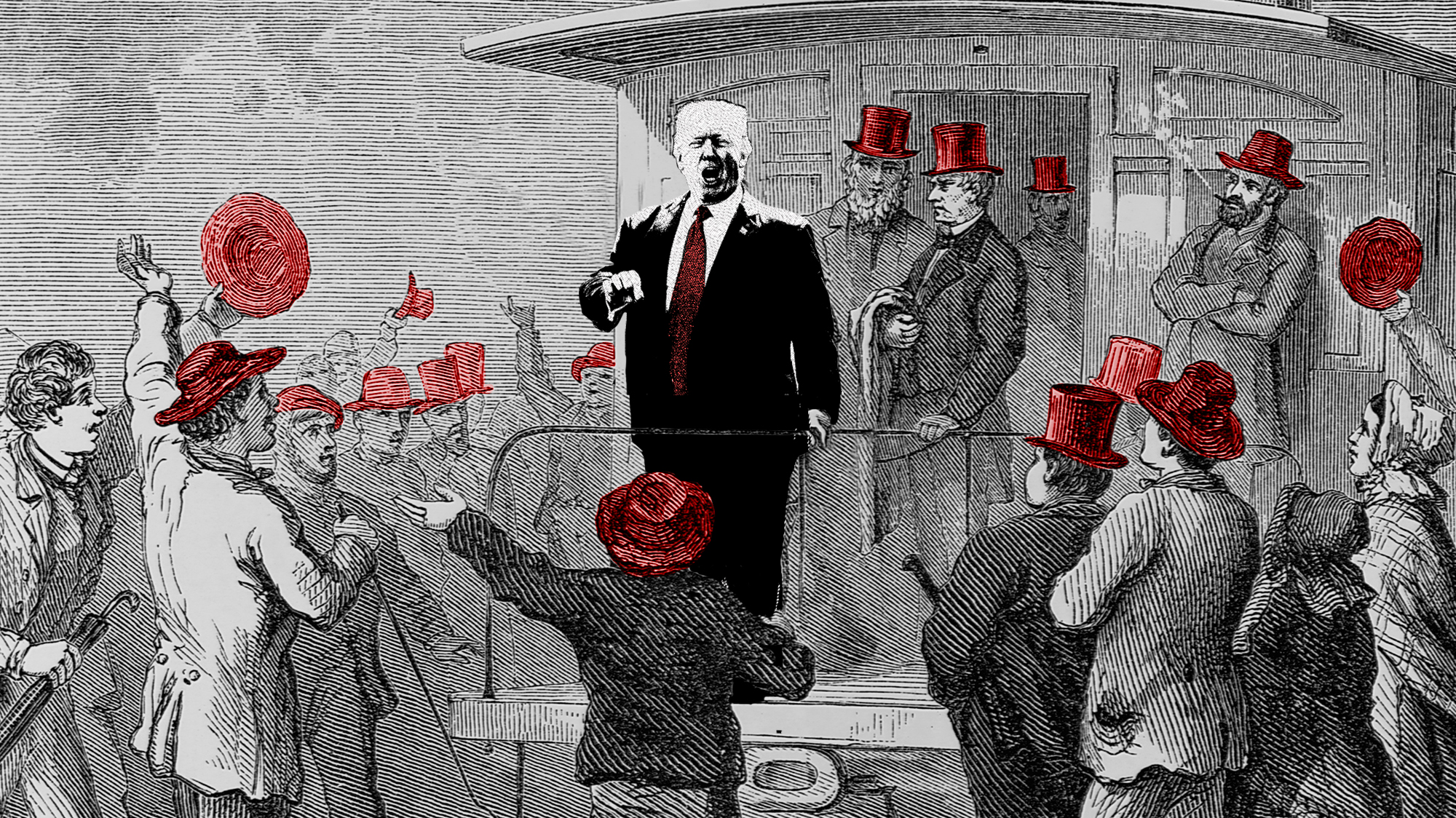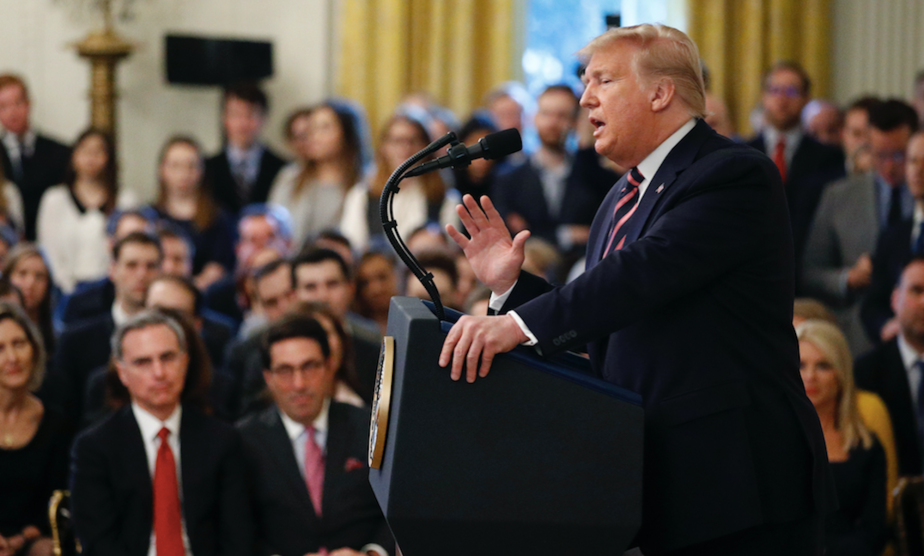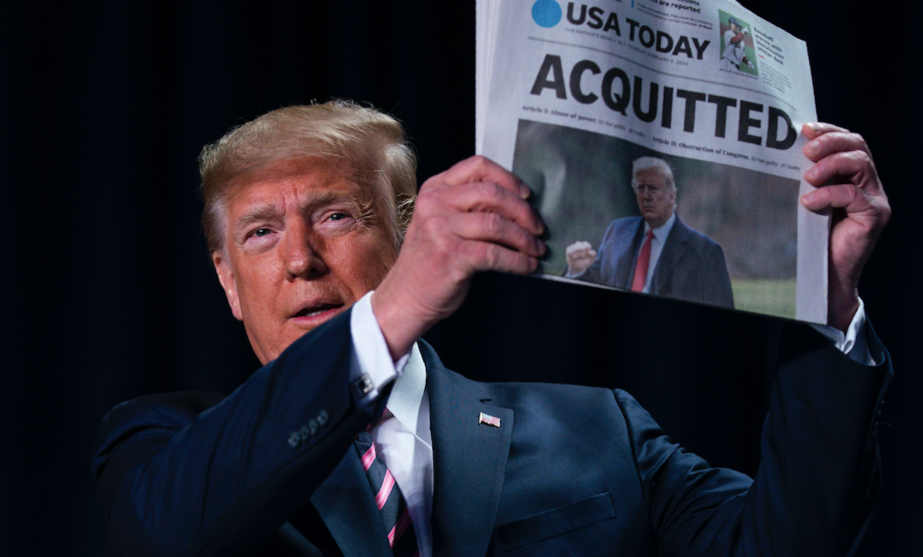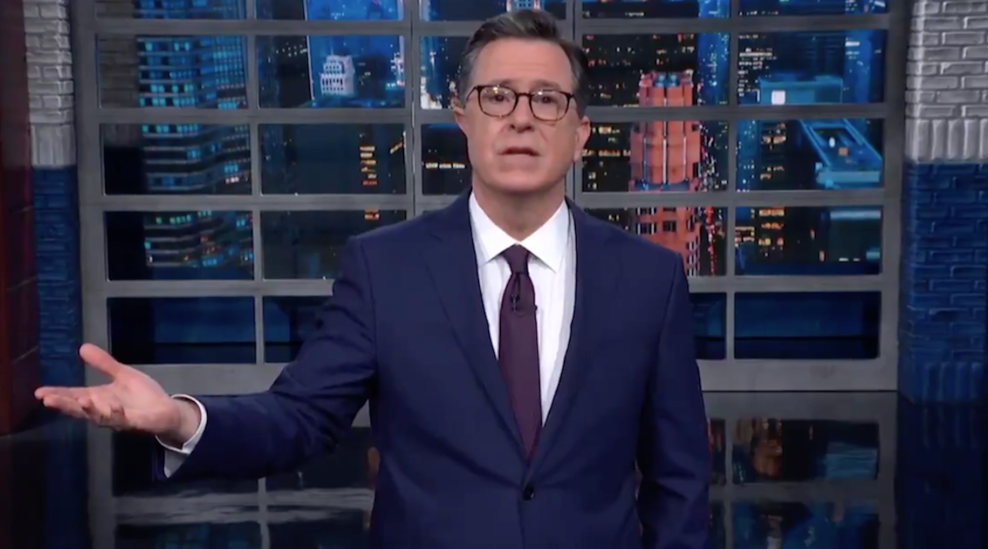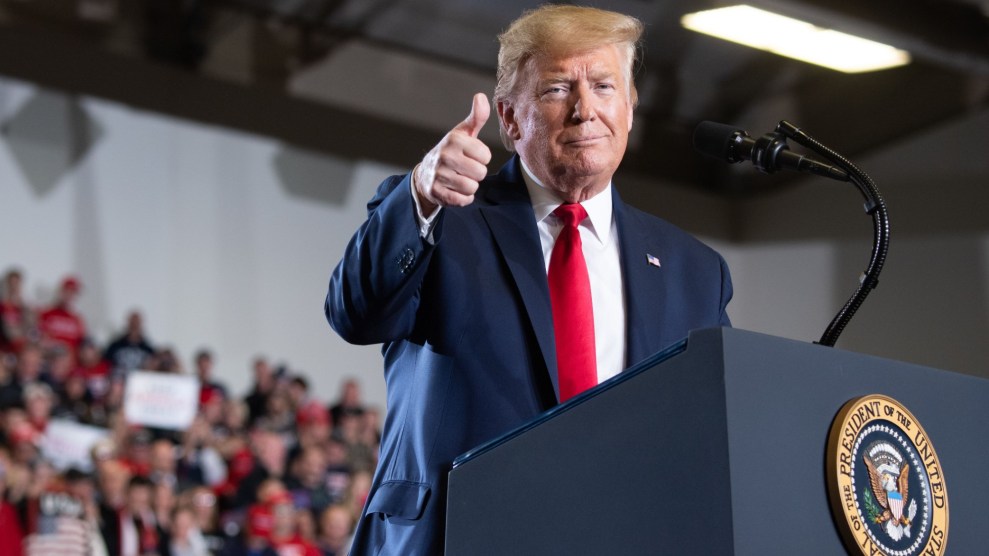It’s not hard to think of a historical precedent for President Donald Trump’s attempts to trade military assistance to the Ukrainian government for actionable dirt on his chief political rival. The pathetic desperation of the crime itself, the bungling attempt at a cover-up, the incriminating transcript—“it really is stupid Watergate,” one Democrat told the Washington Post in September. The similarities to the scandal that forced Richard Nixon from office in 1974 extend to the people talking about it. An attorney on Nixon’s House impeachment committee, Bill Weld, is running for president. John Dean, Nixon’s White House counsel, and Carl Bernstein, who helped break the scandal, are CNN contributors. A Nixon dirty trickster, Roger Stone, recently went on trial for doing more of the same for Trump. And of course there’s Trump himself, channeling Nixon’s appeals to the “silent majority” and “law and order,” and pillorying the “enemy” press. There’s even an attempt to cover up a break-in at the Democratic National Committee—read the partial transcript of Trump’s call with the Ukrainians and you’ll find the president floating a cheese-brained conspiracy theory absolving Russia of its 2016 hacking of the DNC.
But coverage of the Trump fiasco is focusing on the wrong impeachment. The best parallel to Trump isn’t Nixon; it’s Andrew Johnson, a belligerent and destructive faux-populist who escaped conviction in the Senate by the thinnest of margins. Yet for more than a century, the official narrative of the first presidential impeachment has been butchered and distorted, reduced to a historical curiosity, a showdown between two irresponsible factions in which voices of reason ultimately triumphed. You were likely taught (if you were taught at all) that the 1868 fight to remove Johnson from office centered on an obscure and dubious law, the Tenure of Office Act, and that “Radical” Republicans—their influence inflated in the aftermath of the Civil War—overstepped their bounds in a quest for even more power.
This viewpoint was memorialized most famously in John F. Kennedy’s Pulitzer-winning 1956 book, Profiles in Courage, which canonized Edmund G. Ross, the Kansas Republican senator whose last-minute reversal led to Johnson’s acquittal in his Senate trial. The verdict, as recounted by Kennedy, was a triumph of sobriety and institutional scruple, of country over party, of pragmatism over ideology. It’s all the stories official Washington loves to tell about itself, wrapped into one: When both sides are to blame, real heroism can mean doing nothing.
Though popular critics like Kennedy have long framed the case against Johnson as a fight over something small—an act of legalistic nitpicking—the stakes could not have been bigger, and they should feel familiar in the Trump era. The Johnson impeachment was about what kinds of transgressions and values were worth fighting over in a country that in many ways was still at war with itself. No narrow indictment could capture the true nature of his offenses. Sometimes the biggest crimes aren’t criminal at all.
Andrew Johnson was a sort of anti-Lincoln—a stumpy, vengeful, subliterate tailor who rose through the ranks of the Democratic Party in East Tennessee by railing against elites. In 1861, he was the only Southern senator to stay loyal to the Union, leaving him not only without a state but largely without a party. Lincoln appointed him military governor of Tennessee, and later, hoping to shore up his support ahead of his reelection campaign, added Johnson to the ticket. Johnson showed up drunk to his own swearing-in, then hid out at a friend’s house in Maryland, ashamed to show his face. A few weeks later, Lincoln was murdered and Johnson was president. As the historian Brenda Wineapple explains in her lively 2019 book, The Impeachers: The Trial of Andrew Johnson and the Dream of a Just Nation, the road to impeachment began in the violence and political turmoil that followed the assassination, as Johnson wrestled with Republicans in Congress about what postwar Reconstruction should look like. The impeachment process was rife with bumbling and paranoia, but nonetheless centered on a profound question: whether the nation would continue on its path toward a pluralistic democracy or revert to the white supremacist state that had existed before Fort Sumter.
Alarm bells began to sound early on. Johnson was erratic. He was wavering. Frederick Douglass met with him at the White House and came away disturbed. In the meeting, the president had suggested deporting millions of freedmen and appeared not to know that Douglass had been enslaved. Johnson granted mass amnesties to Confederate soldiers and appointed ex-Confederates to key posts. In the spring and summer of 1866, a wave of racial pogroms broke out in the cities of the former Confederacy, targeting African Americans—34 killed in New Orleans; 46 killed in Memphis. Why hadn’t Johnson done anything to stop it? Why was he suddenly blocking every effort by Congress to bring white supremacist violence in the South under control? People who had once seemed enthusiastic about the project ahead were beginning to talk about the I-word.
Wineapple quotes Wendell Phillips, the Massachusetts antislavery activist, speaking after Johnson’s appointment of an ex-secessionist governor in Raleigh: “Better, far better, would it have been for Grant to have surrendered to Lee than for Johnson to have surrendered to North Carolina.”
There’s a lot about the Johnson impeachment that should feel familiar, because, as with Trump, undergirding the whole enterprise was an act of betrayal: The president’s loudest critics believed he had sold out the country and its democratic institutions to a hostile power. After four years of fighting, some 750,000 deaths, and billions in unpaid debts, Johnson was restoring to power the enemy that had just been defeated. High-ranking Confederates were creeping back into positions of influence. Enemy agents—the Ku Klux Klan and its ilk, not Russian hackers—brazenly attacked the foundations of a free republic and terrorized freedmen while the president and his supporters downplayed their existence and enabled their work.
Then, as now, it was easy to fall down a rabbit hole. Just as some Trump critics went searching for the mythical Moscow “pee tape,” members of Congress spent months searching for evidence that would implicate Johnson in Lincoln’s death. Rep. James Ashley (R-Ohio), a floor manager for the 13th Amendment, tried to dig up nonexistent correspondence between Johnson and John Wilkes Booth. Rep. Benjamin Butler (R-Mass.), a crooked walrus of a man who would later serve as impeachment manager, wondered if the 18 pages missing from Booth’s diary might have implicated the president. Politicos speculated about Johnson’s drinking and whether he was frequenting prostitutes. His behavior was so bizarre to them, there had to be some explanation.
And there really was some weird shit going on. Take the case of John Surratt. Although most of the Lincoln conspirators were quickly captured, convicted, and executed by military tribunals, Surratt somehow escaped to Canada and then to Rome, where he changed his name and joined the Papal Guard—yes, that Papal Guard. He wore a fez with a pompom and big poofy pants and carried a musket, and when an American traveling abroad ran into him, Surratt fled to Egypt. He evaded capture for a year, long enough somehow to run out the statute of limitations on kidnapping the president—the conspirators’ original plan, before they switched to murder. By then the military tribunals had been disbanded. Surratt got a friendly jury in Confederate-curious Maryland and by 1868 was a free man.
Strange, yes. Infuriating, very. But hardly, as Rep. George Boutwell (R-Mass.) suggested, evidence of a sinister plot by the president. After all, the Lincoln conspirators would have assassinated Johnson too, if the man tasked with doing it hadn’t thrown away his knife and gotten drunk. There’s an Andrew Johnson in every group.
All of this chimes with our current conspiratorial moment. Unable to square what is happening with their understanding of how things are supposed to work, people start looking for totalizing explanations. They come to believe that the absence of smoke means someone must be covering up a fire, and that is never a good path to go down. That’s how otherwise well-balanced people wind up getting political news from Tom Arnold.
But there was only one true Johnson scandal, just as there is only one true Trump scandal, and though the particulars are very different—the former’s class resentment was the inverse of the latter’s class entitlement—they share a common element: an open hostility to democratic ideals. That was Andrew Johnson’s high crime, and there was nothing conspiratorial or nitpicky about it. He was doing it in plain sight. The rest was noise.
Johnson did not react well to all this talk about his loyalties. In 1866, he decided to go on the offensive, embarking on a national tour to bolster his support. It was called the Swing Around the Circle, and it was insane. It’s tough to find a true analogue. The closest I can come to describing it is, maybe, what if George Wallace spoke at Altamont? Presidents just don’t really talk like Johnson did on that tour, no matter what lurks in their hearts. Even Nixon didn’t talk like that, and Nixon hired a Jew-counter.
There are echoes of the Johnsonian aesthetic, though, in Trump. Suggesting that political opponents should go back to their countries has a Johnsonlike ring to it. Holding rallies where the crowds chant “send her back” is a bit more like it. Casual cracks about political violence and treason, menacing libels of vulnerable classes, endless chatter about “lies” and “enemies,” a persecution complex big enough you could send the 13th Regiment Tennessee Volunteer Cavalry through it—that was the essence of the Swing Around the Circle.
Here, via Wineapple, is Andrew Johnson in St. Louis—the only thing missing is a MAGA hat:
“I have been traduced and abused,” he shot back, his voice tremulous with self-pity. “I have been traduced, I have been slandered, I have been called Judas Iscariot,” he shouted. And just because he exercised his veto power over the Freedmen’s Bureau Bill or Civil Rights, his enemies said he ought to be impeached. The sympathetic members of the crowd cried out, “Never.”
“Yes, yes!” he answered, and then speaking of himself in the third person, cried, “They are ready to impeach him.”
“Let them try it,” his supporters answered back.
But he was incoherent. “There was a Judas once,” Johnson babbled, “one of the twelve apostles. Oh, yes! And these apostles had a Christ, and he could not have had a Judas unless he had twelve apostles.
“If I have played the Judas, who has been my Christ that I have played Judas with?”
It was bewildering. Again, he yelled, “Why don’t you hang Thad Stevens and Wendell Phillips?”
And they never show the crowd!
Johnson’s message, though, was disturbingly lucid: He was the only man standing between you and the mob, and you all know who the mob is. He said that Phillips and Rep. Thaddeus Stevens (R-Pa.) should be executed because they were ready to turn the country over to the black man while putting the white man in chains. In St. Louis, he said the people massacred in New Orleans were the real traitors, that the white people who did it were merely protecting themselves from the coming race war, and that the “Radical Congress” would “disenfranchise white men.” He was saying, with his words and actions, that the tragedy of New Orleans and Memphis was that freedmen had tried to exercise power in the first place. These were the stakes.
It would take two more years before enough Republicans came around to the idea of impeachment. For one thing, because the process was untested at the presidential level, no one really agreed on what constituted an impeachable offense. The Constitution said “high crimes” and “misdemeanors.” Okay—what are those? The handful of previous nonpresidential cases didn’t offer much help. One federal judge had been convicted of joining the Confederacy; another had been acquitted of, in Wineapple’s phrasing, “using rude language.”
Congress is an institution that craves structure. These are the people who practically invented the subcommittee. Stevens, a brilliant parliamentarian and Congress’ most ardent advocate for racial equality, cut through all of the agonizing with a simple answer: An impeachable offense is whatever the hell a majority of the House and two-thirds of the Senate want it to be. “I do not hold that it is necessary to prove a crime as an indictable offense, or any act malum in se,” he said. In fact, Democrats who lamented that impeachment was being used as a political process were correct. It was! “I agree with the distinguished gentleman from Pennsylvania, on the other side of the House, who holds this to be a purely political proceeding. It is intended as a remedy for malfeasance in office and to prevent continuance thereof.”
But Stevens’ colleagues wanted a smoking gun, a clear legal infraction to hang their case on. Things continued to get worse as they twiddled their thumbs.
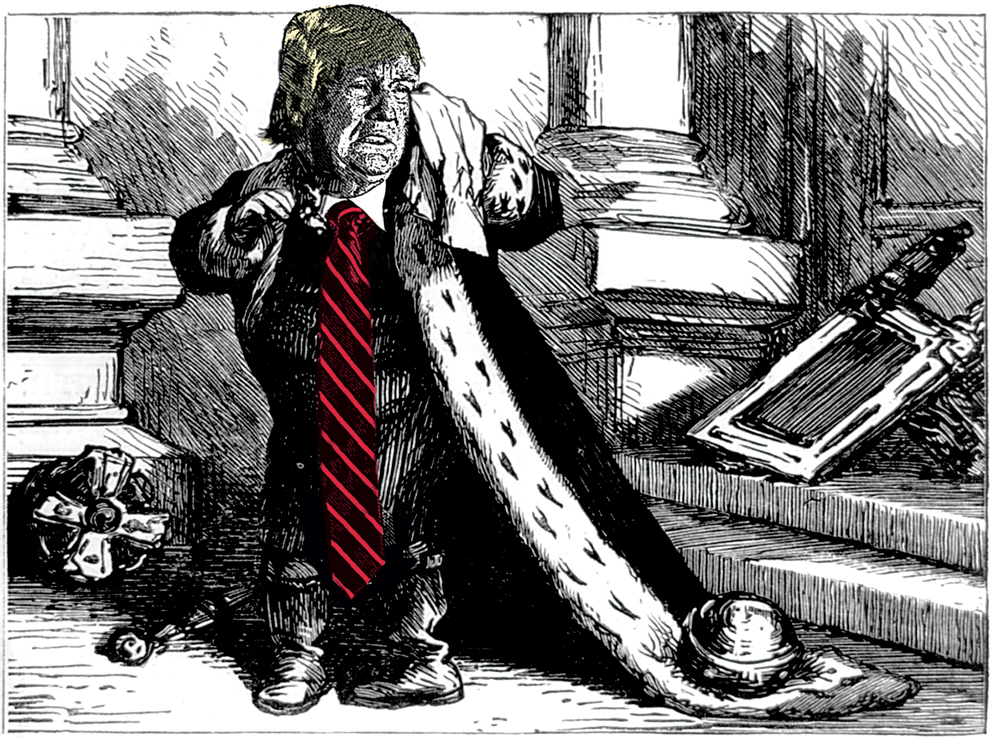
What eventually pushed Congress over the line was Johnson’s violation of a weird law called the Tenure of Office Act, which had been passed, over presidential veto, in early 1867 and prohibited the president from firing Cabinet members without the Senate’s permission. The law is a little arcane and was later found unconstitutional, but it responded to a real crisis. Johnson’s secretary of war, Edwin Stanton, had been appointed by Lincoln. Stanton was responsible for tens of thousands of soldiers throughout the occupied South and was the last line of defense for millions of freedmen trying to exercise their rights in the face of rising white supremacist terror. Johnson wanted to get Stanton out of the way. This wasn’t really about checks and balances; it was a break-the-glass moment for Reconstruction.
The president abided by the law at first, and then changed his mind and suspended Stanton six months later, firing him soon after. His replacement was Lorenzo Thomas, a drunk desk jockey (Johnson had a type) whose main qualification seemed to be his lack of any. After he accepted the job, as Wineapple tells it, Thomas very meekly approached Stanton to tell him that he—Thomas—was in charge, then attended a masquerade ball, got hammered, and was found the next morning wandering the streets of Washington telling pedestrians that he intended to raise an army to drive Stanton from his office.
Stanton moved his belongings into the War Department, barricaded the doors, and refused to leave the building. This wasn’t normal. Johnson had already said his critics should be hanged. He had stated he would not sic the Army on Congress—which is the kind of thing you only really say if you’ve thought about it. Now some neighborhood drunk was going to take over the War Department. The House finally had its actionable offense. In 1868, three years after Johnson took office, the chamber voted to impeach.
Stevens, Boutwell, and their allies were up against more than just an unhinged president with a drinking problem. They also had to deal with nervousness and dissent within their own ranks. Although Republicans were mostly united in their antipathy to Johnson, they broke down into disparate factions on impeachment. There were the diehards, of course, and the outright opponents, but the rest were subject to the whims of the moment—people who believed that, yes, the president was bad, but they should convict him at the ballot box, or people who gave lip service to the cause but whose true passion was fiscal responsibility. (Because Johnson had no vice president, his removal would have placed the Senate president pro tempore, Ben Wade, in the Oval Office—a nightmare scenario for hard-money bankers.)
In other words, they had to confront the Washington process scolds. Today, the most ardent supporters of impeachment on the left are plenty familiar with the type—these are the people obsessed with the means of governance rather than its ends. In the minds of process scolds, the only thing worse than the problems is the act of doing something about them. They are duly concerned about possible threats to pluralism, but tut-tut about the discourse when a Muslim congresswoman says she wants to “impeach the motherfucker” who called for Muslims to be banned from entering the United States. Their response to investigations always involves more investigations. These are the people who invented the subcommittee.
For impeachers of any era, the process scolds are the most vexing opponents, because on a fundamental level they disagree about what impeachment should be for. Is this about a specific violation of the law? Does it require a narrow, targeted investigation? Or is it about everything?
The impulse to make impeachment about something narrow and specific is what led Congress to devote the first eight articles of the Johnson impeachment to the Tenure of Office Act. But there was more to it than that. The ninth article focuses on charges that Johnson had circumvented the chain of command to give direct orders to a general. (No small deal in 1868.) The next two articles are the ones that no one talks about—in its coverage of the Clinton impeachment, CNN dismissed Article 10 as a “historical curiosity”—but they get to the root of the matter. That’s because Stevens, the beating heart of Radical Republicanism, co-wrote them.
Each is a sort of omnibus provision. Article 10 indicts Johnson for his behavior on the Swing Around the Circle tour—not just for his death threats against members of Congress and other critics, not just for a long, rambling aside about being Jesus, but also for his role in enabling white supremacist violence. It quotes extensively from his speeches. Article 11 focuses on his denigration of Congress and his overall pattern of obstruction. These two articles were the subtext of everything else; Johnson’s antipathy toward Reconstruction was the reason there was a Tenure of Office Act. The president was a white nationalist who was nullifying a war.
You already know how it ends, of course. The Senate trial lasted more than two months. There were tactical errors by the impeachment managers, and a whole lot of what people these days would call gaslighting. At one point, one of Johnson’s personal attorneys pooh-poohed the notion that a new masked group was terrorizing the South; within three years, Johnson’s attorney general would be working as a lawyer for the Ku Klux Klan. Opponents of Reconstruction had to lie about what was happening in the South because they, too, knew that this impeachment fight wasn’t just about Cabinet appointments. After a characteristically strange trial presided over by a chief justice with presidential ambitions of his own, Johnson was acquitted by one vote—our friend Edmund Ross, of Kansas.
Decades after Profiles was published, Ross continues to haunt Washington as a sort of patron saint of forbearance whose name is invoked whenever a constitutional crisis is in the offing. As the Watergate scandal came to a head in 1974, Kansas Sen. Bob Dole told reporters he had started reading up on Ross. “I wouldn’t mind losing my seat if the man is innocent and I voted to clear him,” he said.
In 1999, in the midst of the Clinton impeachment, a New York Times political reporter heralded Ross as the name that comes up “whenever people talk about courage, honor and duty.” Ross was “a man who lived to see himself vindicated by history” and “chose personal ruin rather than betray his principles,” the author wrote, casting Johnson as a victim of partisan overreach. His impeachers “wanted to punish the defeated Confederate states rather than continue Abraham Lincoln’s policy of reconciliation, as Johnson did.”
Johnson—and Ross—benefited from a myth that took hold in the century that followed their impeachment drama. Successive generations of historians flipped the script on Reconstruction, framing white Southerners as victims of a tyrannical Northern regime. Reconstruction governments were painted as hopelessly corrupt, and Radical Republicans—such as Stevens—were on a power trip. The Lost Causers had joined up with the process scolds.
By the time Clinton went on trial in the Senate, a more reasoned consensus had emerged among historians, but the political press continued to portray Johnson as a victim. It got to be too much for Columbia University professor Eric Foner, the nation’s foremost Reconstruction scholar, who lashed out at the coverage in 1999. “It’s unbelievable how ignorant of American history they are,” he said. “They got in their mind the idea that, well, Clinton’s a good guy who a bunch of fanatics in Congress were trying to get rid of, so that’s what happened to Andrew Johnson, and a good analogy. It was appalling.”
At least part of the myth is true: After casting his vote against conviction, Ross was vilified by members of his party, and he did lose his Senate seat. But it wasn’t a terribly long exile—he was appointed governor of the New Mexico Territory in 1885, and eventually many of his onetime critics were ready to move on. James G. Blaine, a Maine Republican who had voted to impeach, later argued that conviction “would have resulted in greater injury to free institutions than Andrew Johnson in his utmost endeavor was able to inflict.” Ross’ rehabilitation coincided with a shift in his own party. White Republicans steadily lost enthusiasm for Reconstruction in the decade after impeachment, and Jim Crow took hold across the South.
But JFK—or his ghostwriter, Ted Sorensen—left out some important details about the courageous Ross. For one thing, his vote wasn’t as critical as it’s been portrayed; Johnson’s defenders had more potential “no” votes in their pocket that they didn’t end up using. More importantly, he was probably bribed to vote that way! Or at least the people doing the bribing seemed to think so. There was a lot of shadowy stuff happening in the runup to the vote, and Ross already owed his job to some fairly brazen horse-trading back in Kansas. When the president’s acquittal was complete, Ross quickly returned to Johnson with a laundry list of favors, including patronage jobs for his personal associates as Indian agents, and ratification of a treaty giving away Osage lands to a railroad company. Sabotaging efforts at protecting the civil rights of Black Americans in order to profit off American Indians really does take some of the shine off the halo.
It’s all the more striking because the people Kennedy takes to task in these chapters are, in many cases, his most distinguished Massachusetts predecessors. Butler, the impeachment manager, is repeatedly referred to as “the butcher of New Orleans,” presumably because a resident of the city was executed for treason on his watch in 1862; the actual massacre of Black residents of New Orleans that precipitated the impeachment is never mentioned. Kennedy takes aim at Sen. Charles Sumner (who at the time of the Johnson impeachment still bore the scars of a brutal beating at the hands of a South Carolinian colleague); Wendell Phillips, of the American Anti-Slavery Society; and George Boutwell, an abolitionist whose congressional seat Kennedy would one day hold.
Kennedy and Sorensen show their hand when they savage Adelbert Ames, another Northern Republican, who moved to Mississippi in the 1860s to serve as governor:
No state suffered more from carpetbag rule than Mississippi. He was chosen Governor by a majority composed of freed slaves and Radical Republicans, sustained and nourished by Federal bayonets. One Cardoza, under indictment for larceny in New York, was placed at the head of public schools and two former slaves held the offices of Lieutenant Governor and Secretary of State. Vast areas of northern Mississippi lay in ruins. Taxes increased to a level fourteen times as high as normal in order to support the extravagances of the reconstruction government and heavy state and national war debts.
Reconstruction, they wrote, was “a black nightmare the South could never forget.”
You can tell a lot about people by the lines they choose to draw. For Ross’ defenders, the line wasn’t the creation of a white supremacist state through terrorism; it was the use of a constitutional mechanism to remove the president responsible for creating such a state. Blaine, with his elegy on the “greater injury,” said it pretty much directly. This is the eternal lie of comity and decorum, the cowardice of compromise, though the stakes have almost never been as high as they were then, not even now.
The Johnson impeachment got bogged down in a morass of legal procedure and political calculations. It was suffused with paranoia and sometimes slapstick, but it was fundamentally about values and power, and about what kind of country would emerge out of its greatest conflict. Plenty of people—“people of their time,” as the apologia goes—understood that bloodshed was the price of inaction, that there was nothing courageous about meek deference to power.
The real tragedy of the trial wasn’t poor, pathetic Edmund Ross losing his seat. When the vote fails, Wineapple takes us to places that Kennedy never ventured in his book—churches in Charleston and Memphis where African Americans mourned what they knew they’d lost, steeling themselves for the fight to come. They knew what the impeachment was really about, and they knew who had won. As Foner put it, “Andrew Johnson was impeached over violating a fairly minor act of Congress, whereas his real crime was trying to deprive 4 million American citizens of all their rights.”
Wineapple is too serious and disciplined a historian to say exactly what we should think about all this. The pieces are there, though, and it’s not my book, so here goes: At least they impeached the motherfucker.
This article was featured in Mother Jones’s January/February 2020 print issue, and has been updated to reflect research and editorial changes.
